2018高考构词法之派生法
派生词构词方法
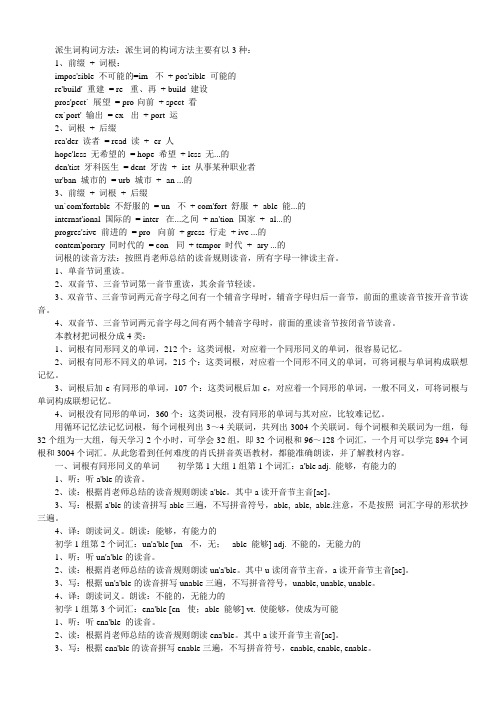
派生词构词方法:派生词的构词方法主要有以3种:1、前缀+ 词根:impos'sible 不可能的=im- 不+ pos'sible 可能的re'build' 重建= re- 重、再+ build 建设pros'pect` 展望= pro-向前+ spect 看ex`port' 输出= ex- 出+ port 运2、词根+ 后缀rea'der 读者= read 读+ -er 人hope'less 无希望的= hope 希望+ less 无...的den'tist 牙科医生= dent 牙齿+ -ist 从事某种职业者ur'ban 城市的= urb 城市+ -an ...的3、前缀+ 词根+ 后缀un`com'fortable 不舒服的= un- 不+ com'fort 舒服+ -able 能...的internat'ional 国际的= inter- 在...之间+ na'tion 国家+ -al...的progres'sive 前进的= pro- 向前+ gress 行走+ ive ...的contem'porary 同时代的= con- 同+ tempor 时代+ -ary ...的词根的读音方法:按照肖老师总结的读音规则读音,所有字母一律读主音。
1、单音节词重读。
2、双音节、三音节词第一音节重读,其余音节轻读。
3、双音节、三音节词两元音字母之间有一个辅音字母时,辅音字母归后一音节,前面的重读音节按开音节读音。
4、双音节、三音节词两元音字母之间有两个辅音字母时,前面的重读音节按闭音节读音。
本教材把词根分成4类:1、词根有同形同义的单词,212个:这类词根,对应着一个同形同义的单词,很容易记忆。
2、词根有同形不同义的单词,215个:这类词根,对应着一个同形不同义的单词,可将词根与单词构成联想记忆。
高中英语构词法之三大构词法:合成法、派生法和转化法

英语构词方法主要有三种:即合成法、派生法和转化法。
1、合成法将两个或两个以上的单词合成在一起而构成的新词,叫做合成词。
(1)合成形容词①名词+现在分词例:English-speaking 讲英语的,south-facing 朝南的②名词+过去分词例:man-made 人造的,water-covered 被水覆盖的③名词+形容词例:snow-white 雪白的,day-long 整天的④形容词+名词+-ed 例:warm-hearted 热情的,kind-hearted 好心肠的⑤形容词/副词+现在分词例:good-looking 好看的 funny-looking 滑稽的⑥副词+过去分词例:well-known 出名的,deep-set(眼睛)深陷的⑦副词/形容词+名词例:right-hand 右手的,full-time 专职的⑧数词+名词例:100-meter 100米的,million-pound 百万英镑的⑨数词+名词+形容词例:180-foot-high 180英寸高的,10-year-old 10岁的⑩数词+名词+-ed 例:four-footed/legged 四脚的,one-eyed 独眼龙的(2)合成名词①名词+名词例:weekend 周末,classroom 教室,bookshop 书店②形容词/介词+名词例:gentleman 绅士,loudspeaker 扬声器③动词+名词例:typewriter 打字机,cookbook 烹调书④名词+动词例:daybreak 破晓,toothpick 牙签⑤动词-ing形式+名词例:reading-room 阅览室,sleeping-car 卧车车厢⑥副词+动词例:outbreak 爆发,downpour 倾盆大雨⑦名词+动名词例:handwriting 笔迹,sun-bathing 日光浴⑧名词+in/to0+名词例:mother-in-law 岳母,brother-in-law 姐夫(3)合成动词①副词+动词例:overthrow 推翻,understand 理解②形容词+动词例:broadcast 广播,whitewash 粉刷③名词+动词例:typewrite 打字,sleepwalk 梦游(4)合成副词①介词+名词例:underfoot 脚下,beforehand 事先②形容词+名词例:hotfoot 匆忙地,someday 有朝一日③形容词+副词例:anywhere 任何地方,outwards 向外、(5)合成介词:within在……之内,without没有,inside在……里边,into进入(6)合成代词:myself我自己,ourselves我们自己,anyone任何人,nobody没有人nothing 没东西,somebody有人。
构词法之派生法

构词法之派生法 Life is more meaningful because realizing dreams英语构词法一、构词法之派生法的讲解英语构词法主要有:合成法;转化法;派生法;混成法;截短法和词首字母缩略法..派生 Derivation前缀后缀注意: -ese; -ian; -ist 既可以构成名词;又可以构成形容词.. -er 构成的名词;既有表示人的;又有表示物的..二、课堂巩固练习Ⅰ.Match the right words from the right column with the words on the left.1. enrich A. trying to find jobs2.semicircleB. remove; get rid of ice; frost3.troublesomeC. of; having; using imagination4. sharpen D. make or become sharp5. job-huntingE. half a circle6.limitlessF. causing trouble7. imaginative G. make rich; improve in quality; flavour; etc.8. defrost H. without limitⅡ.Use the appropriate form of the words to fill in the blanks.1. The mother didn’t know why her daughter was crying _______. noise2. He was one of the best _______ in yesterday’s football match. play3. Look How ______ Kate is laughing happy4. It snowed _____ last night and now the streets are covered with snow. heavy5. Edison was a great ______. During his life he had many ______. invent6. More and more _____ have come to visit China over these years. foreign7. We want _________ reasons for your failure to help. satisfy8. Please give me some reference work. It will ______ my task. simple9. The boy had the _______ of being half starved. appear10. The police have _______ a plot against the President. cover11. The doctor said that Mary’s mot her needed an _______.operate12. She hoped that her son would become a _______. music13. Few ______ words made us excited. speak14. The days on the moon get hotter than ______ water. boil15. Thank you for your _________. kind16. Many college students work while they are studying because they want to make some money for their college _____. expensive17. Most international ______ letters are written in English; too. busy18. The boy noticed an ______ mistake on his paper; but he decided not to say anything about it. correct 19. When in Rome; do as the _____ do. Rome20. The teacher was pleased with her _______. honest。
2018高考构词法之派生法

demonstrate-demonstration示威游行
contribute-contribution贝献distribute-distribution分发promote-promotion促进devote-devotion奉献,献身dedicate-dedication奉献,献身frustrate-frustration沮丧
introduce-introduction介绍reduce减少produce-production生产
compete-competition比赛,竞争repeat-repetition重复suppose-supposition认为/假设oppose-opposition反对define-definition定义
carry-carriage车厢pass-passage通道
-al
approve—approval赞成;批准arrive—arrival至U来;至U达survive—survival幸存
propose—proposal提议;建议refuse-refusal拒绝deny-denial否认
-ance
appear—appearance出现;夕卜貌guide—guidance扌旨弓1;扌旨导perform—performance表演;履行accept-acceptance接受allow-allowance津贴,零用钱assist-assistance帮助,协助rely-reliance依赖resist-resistance抵制enter-entrance进入insure-insurance保险ignore-ignorance忽视endure-endurance/tolerate-tolerance忍受annoy-annoyance烦恼
三种英语基本构词法(派生、合成、转化)
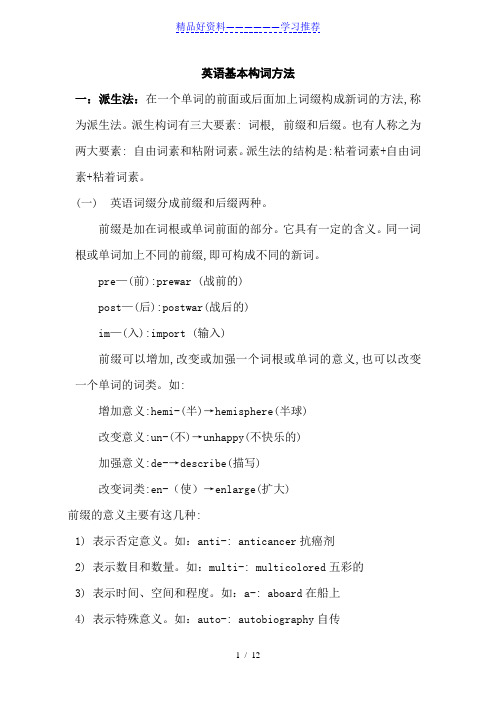
英语基本构词方法一:派生法:在一个单词的前面或后面加上词缀构成新词的方法,称为派生法。
派生构词有三大要素: 词根, 前缀和后缀。
也有人称之为两大要素: 自由词素和粘附词素。
派生法的结构是:粘着词素+自由词素+粘着词素。
(一)英语词缀分成前缀和后缀两种。
前缀是加在词根或单词前面的部分。
它具有一定的含义。
同一词根或单词加上不同的前缀,即可构成不同的新词。
pre—(前):prewar (战前的)post—(后):postwar(战后的)im—(入):import (输入)前缀可以增加,改变或加强一个词根或单词的意义,也可以改变一个单词的词类。
如:增加意义:hemi-(半)→hemisphere(半球)改变意义:un-(不)→unhappy(不快乐的)加强意义:de-→describe(描写)改变词类:en-(使)→enlarge(扩大)前缀的意义主要有这几种:1)表示否定意义。
如:anti-: anticancer抗癌剂2)表示数目和数量。
如:multi-: multicolored五彩的3)表示时间、空间和程度。
如:a-: aboard在船上4)表示特殊意义。
如:auto-: autobiography自传后缀是加在词根或单词后面的部份。
后缀有四种,即:名词后缀、形容词后缀、动词后缀和副词后缀。
后缀不仅改变词的意义,而且使单词由一种词类转化成另一种词类。
1)名词后缀,它有许多种,如:表示人:-er: worker工人;teacher教师-ist:artist艺术家;chemist药剂师表示物:-or: tractor拖拉机;generator发电机-ant:disinfectant消毒剂; dependant依附物表示抽象名词:-hood: childhood童年;neighborhood邻居关系-ship: friendship友谊;horsemanship骑马术表示集合名词:-ry: peasantry农民总称;citizenry公民总称-age: mileage英里数;teenage十几岁的时期表示场所地点:-ery: piggery养猪场;greenery花房,温室-ern: saltern制盐场;cavern洞穴表示疾病:-oma: trachoma沙眼症;neuroma神经瘤-itis: bronchitis支气管炎;arthritis关节炎表示……学::-logy:zoology动物学;anthropology人类学-ics: electronics电子学;statistics统计学2)形容词后缀表示一种事物具有或属于某种性质或状态。
高考英语冲刺指南词汇的构词法与记忆技巧
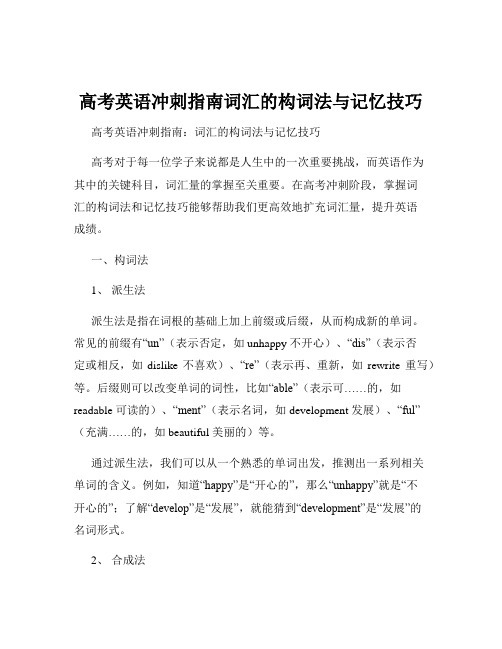
高考英语冲刺指南词汇的构词法与记忆技巧高考英语冲刺指南:词汇的构词法与记忆技巧高考对于每一位学子来说都是人生中的一次重要挑战,而英语作为其中的关键科目,词汇量的掌握至关重要。
在高考冲刺阶段,掌握词汇的构词法和记忆技巧能够帮助我们更高效地扩充词汇量,提升英语成绩。
一、构词法1、派生法派生法是指在词根的基础上加上前缀或后缀,从而构成新的单词。
常见的前缀有“un”(表示否定,如 unhappy 不开心)、“dis”(表示否定或相反,如dislike 不喜欢)、“re”(表示再、重新,如rewrite 重写)等。
后缀则可以改变单词的词性,比如“able”(表示可……的,如readable 可读的)、“ment”(表示名词,如 development 发展)、“ful”(充满……的,如 beautiful 美丽的)等。
通过派生法,我们可以从一个熟悉的单词出发,推测出一系列相关单词的含义。
例如,知道“happy”是“开心的”,那么“unhappy”就是“不开心的”;了解“develop”是“发展”,就能猜到“development”是“发展”的名词形式。
2、合成法合成法是将两个或两个以上的单词组合在一起,构成一个新的单词。
例如,“classroom”(教室)由“class”(班级)和“room”(房间)合成;“blackboard”(黑板)由“black”(黑色的)和“board”(板)组成。
在记忆这类单词时,可以将它们拆分成熟悉的部分,理解各个部分的含义,从而记住整个单词。
3、转化法转化法是指单词的词性发生了变化,但词形不变。
比如,“water”作名词是“水”,作动词是“浇水”;“book”作名词是“书”,作动词是“预订”。
了解这种构词法能够帮助我们更灵活地运用单词,丰富我们的表达。
二、记忆技巧1、联想记忆法联想记忆法是通过将新单词与已知的事物、场景、经历等建立联系,从而加深记忆。
比如,“pest”(害虫)这个单词,可以联想成“拍死它(pest),因为它是害虫”。
高三英语一轮复习构词法之派生课件

二. 动词/名词变形容词常见的后缀;
1. –able 2. –al 3. –ful
suitable personal musical
harmful hopeful
confused scared
surprising convincing
二. 动词/名词变形容词常见的后缀;
6. –ible 7. –ive 8. –ous
四. 形容词变名词后缀; 1. --dom
3. –th 4. –ty 5.—ce 6. –age 7. –ity 8.--
单词: free--_______f_r_e_e_d_o_m____ weak--_______w__e_a_k_n_e_s_s_ warm--_______w__a_r_m_t_h___ safe--________s_a_fe_t_y______ short--_______s_h_o_r_t_a_g_e___ disable--________d_is_a_b_i_li_ty_ silent--_______s_i_le_n_c_e_____ fluent--_______f_lu_e_n_______ important--___im__p_o_r_t_a_n_c_e_____
⑥iron lady
女汉子
①disclose one's secret 前缀 ②Microblog 前缀
前缀:一般只改变词意, 不改变词类
③gelivable/ungelivable 后缀
后缀:一般只改变词类,
④envious,jealous,and hateful 后缀
不引起词意变化
⑤group purchasing 合成
派生法:
1.形容词+ly变副词; 2. 动词/名词变形容词的后缀; 3. 动词变名词的后缀; 4. 形容词变名词的后缀; 5. 表示‘人’的后缀; 6. 表示否定或否定意义的前缀和后缀; 7.变动词的前缀和后缀。
2018年浙江高考一轮附录1 构词法
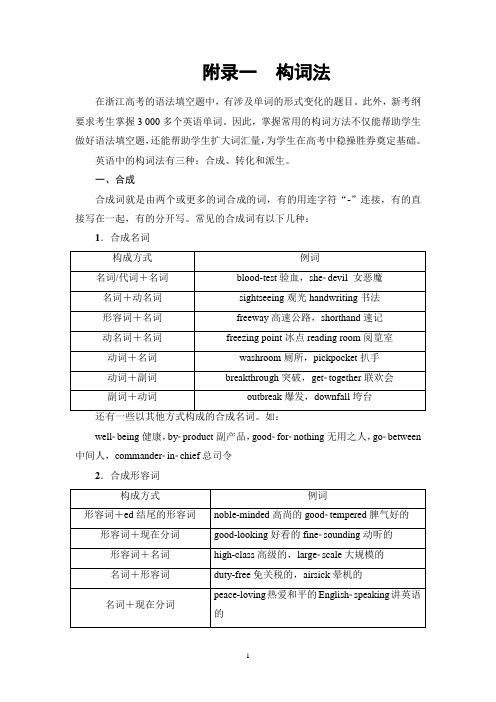
附录一构词法
在浙江高考的语法填空题中,有涉及单词的形式变化的题目。
此外,新考纲要求考生掌握3 000多个英语单词。
因此,掌握常用的构词方法不仅能帮助学生做好语法填空题,还能帮助学生扩大词汇量,为学生在高考中稳操胜券奠定基础。
英语中的构词法有三种:合成、转化和派生。
一、合成
合成词就是由两个或更多的词合成的词,有的用连字符“-”连接,有的直接写在一起,有的分开写。
常见的合成词有以下几种:
1.合成名词
wellbeing健康,byproduct副产品,goodfornothing无用之人,gobetween 中间人,commanderinchief总司令
2.合成形容词
anywhere在任何地方;nowhere任何地方都不;somewhere在某处;everywhere 到处;upstairs在楼上;indoors在室内;however无论如何;whenever无论何时;somehow不知怎么地;anyhow不管怎样;anyway不管怎样;anytime在任何时候;sometimes有时;nowadays现今;otherwise否则
二、转化
把一种词性用作另一种词性而词形不变的方法叫作转化。
派生法即由一个词根加上前缀或后缀构成另一个词。
1.常见的前缀(前缀通常只改变词义,不改变词性)
同时会改变词义。
)。
构词法之派生法
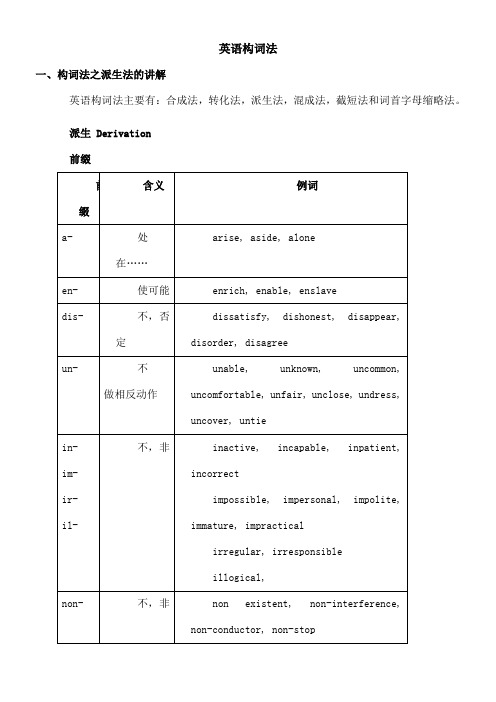
英语构词法一、构词法之派生法的讲解英语构词法主要有:合成法,转化法,派生法,混成法,截短法和词首字母缩略法。
派生 Derivation前缀后缀注意: -ese, -ian, -ist 既可以构成名词,又可以构成形容词。
-er 构成的名词,既有表示人的,又有表示物的。
二、课堂巩固练习Ⅰ.Match the right words from the right column with the words on the left.( ) 1. enrich A. trying to find jobs( ) 2.semicircleB. remove, get rid of ice, frost( ) 3.troublesomeC. of, having, using imagination( ) 4. sharpen D. make or become sharp( ) 5.job-hunting E. half a circle( ) 6.limitlessF. causing trouble( ) 7. imaginative G. make rich, improve in quality, flavour, etc.( ) 8. defrost H. without limitⅡ.Use the appropriate form of the words to fill in the blanks.1. The mother didn’t know why her daughter was crying _______. (noise)2. He was one of the best _______ in yesterday’s football match. (play)3. Look! How ______ Kate is laughing! (happy)4. It snowed _____ last night and now the streets are covered with snow. (heavy)5. Edison was a great ______. During his life he had many ______. (invent)6. More and more _____ have come to visit China over these years. (foreign)7. We want _________ reasons for your failure to help. (satisfy)8. Please give me some reference work. It will ______ my task. (simple)9. The boy had the _______ of being half starved. (appear)10. The police have _______ a plot against the President. (cover)11. The doctor said that Mary’s mother needed an _______.(operate)12. She hoped that her son would become a _______. (music)13. Few ______ words made us excited. (speak)14. The days on the moon get hotter than ______ water. (boil)15. Thank you for your _________. (kind)16. Many college students work while they are studying because they want to make some money for their college _____. (expensive)17. Most international ______ letters are written in English, too. (busy)18. The boy noticed an ______ mistake on his paper, but he decided not to say anything about it. (correct) 19. When in Rome, do as the _____ do. (Rome)20. The teacher was pleased with her _______. (honest)。
高中英语构词法之合成,派生,转化法

合成法:将两个或两个以上的单词合成在一起而构成新词的方法,叫做合成法。
通过合成法构成的词的数量在英语词汇中排第二位;合成词的形式有:①两个词放在一起合为一个词,如:classroom;②形式上是两个词,但是一个整体意思,如waiting room;③两个词之间用连字符连接,如:pencil-box.Ⅰ、初次遇到一个不认识的合成词,可以先分析其构成,记住常见的复合词的构成方式是掌握合成法的关键。
1. 合成形容词①名词+现在分词例:English-speaking 讲英语的,south-facing朝南的②名词+过去分词例:man-made 人造的,water-covered 被水覆盖的③名词+形容词例:snow-white 雪白的,day-long整天的④形容词+名词+-ed 例:warm-hearted 热情的,kind-hearted 好心肠的⑤形容词/副词+现在分词例:good-looking 好看的,funny-looking滑稽的⑥副词+过去分词例:well-known 出名的,deep-set(眼睛)深陷的⑦副词/形容词+名词例:right-hand 右手的,full-time 专职的⑧数词+名词例:100-meter 100米的,million-pound百万英镑的⑨数词+名词+形容词例:180-foot-high 180英尺高的,10-year-old 10岁的⑩数词+名词+-ed 例:four-footed/legged 四脚的,one-eyed一只眼的2. 合成名词①名词+名词例:weekend 周末,classroom 教室②形容词/介词+名词例:gentleman 绅士,loudspeaker扬声器③动词+名词例:typewriter 打字机,cookbook 烹调书④名词+动词例:daybreak 破晓,toothpick 牙签⑤动词-ing形式+名词例:reading-room 阅览室,sleeping-car 卧车车厢⑥副词+动词例:outbreak 爆发,downpour 倾盆大雨⑦名词+动名词例:handwriting 笔迹,sun-bathing日光浴⑧名词+in/to+名词例:mother-in-law 岳母,brother-in-law姐夫3. 合成动词①副词+动词例:overthrow 推翻,understand 理解②形容词+动词例:broadcast 广播,whitewash 粉刷③名词+动词例:typewrite 打字,sleepwalk 梦游4. 合成副词①介词+名词例:underfoot 脚下,beforehand 事先②形容词+名词例:hotfoot 匆忙地,someday 有朝一日③形容词+副词例:anywhere 任何地方,outwards 向外5. 合成介词:within在……之内,without没有,inside在……里边,into进入……里6. 合成代词:myself我自己,ourselves我们自己,anyone任何人,nobody没有人nothing没东西,somebody有人。
英语构词法中的派生法

英语构词法中的派生法派生法(derivation): 在词根前面加前缀或在词根后面加后缀,从而构成一个与原单词意义相近或相反的词。
前缀(prefix): 一般改变意义,不改变词性。
表示否定的:dis-, like---dislike, appear---disappear, agree---disagree,cover---discover,il-, legal---illegal, literate---illiterate;im-, possible---impossible, polite---impolite,mortal-immortal;in-, correct---incorrect, direct---indirect, complete---incomplete;ir-, regular-irregular, relative---irrelative,revocable---irrevocable, capable of being revoked; able to be cancelled, revoke: (transitive) to take back or withdraw; cancel; rescind ? to revoke a law2. (intransitive) cardsto break a rule of play by failing to follow suit when able to do so; renege,renege. (intransitive; often foll by on) to go back (on one's promise, etc)mis-,“错误,坏” take---mistake, understand---misunderstand, fortune---misfortune, lead---mislead, mischievous;mal-, “坏,恶的”function---malfunction, maladroit笨拙的(mal+adroit灵巧的) adjective 1. skilful or dexterous 2. quick in thought or reaction, malevolent恶意的(male+vol意志+ent→坏意志) 1. wishing or appearing to wish evil to others; malicious 2. astrology having an evil influence;non-,“不,非”’ fiction---non-fiction, non-cooperation, non-negotiable, non-stop直达的,non-profit, non-commercial;un-, “不,非”happy---unhappy, fair---unfair, like---unlike(不像),certain-uncertain,known-unknown,usual-unusual,important-unimportant, accessable---unaccessable, accountable---unaccountable, fold-unfold,前缀a-,① 加在单词或词根前面,表示”不,无,非”, acentric 无中心的(a+centric中心的) asocial 不好社交的(a+social好社交的) ;amoral 非道德性的(a+moral道德的;注意:immoral apolitical.不关政治的(a+political政治的) anemia 反常的(a+nomal正常的+ous)② 加在单词前,表示”在…,…的” ,asleep 睡着的(a+sleep睡觉),aside 在边上(a+side旁边),ahead 在前地(a+head头),alive 活的(a+live活) awash .泛滥的(a+wash冲洗),alike(相似的,一样的);前缀中的:anti-, “反对,抵抗, against,opposed to,opposite of,instead”,anti-war, antitrust, antibiotic, antioxidant,antibody, antigen, anti-semitic等;auto-, “自动的,self, personally, 表示自己”,automate, automation 自动化,autograph 亲笔,autoalarm 自动报警器,autocriticism 自我批评,autorotation自动旋转,autobiography 自传,autonomous [??'tɑ?n?m?s]a. 自治的;automatic, automatically, autonomy, automobile,automated, autopsy, autograph亲笔签名,手稿, automotive, ,autocrat 独裁者,autocracy,automata, automaton, autoclave, automaker, autoindex自动索引;co-, “共同”,coworker, collegiate, colleague, cooperate;en-, “使”,enlarge, encourage, enhance, enable, enact, enroll, encompass,inter-,“相互,between在---之间”,international, internet, interview, intercontinental洲际的,interchange, interfere, interrupt, interpose,mini-, “小”,minibus, ,miniskirt, miniature, minify, minimum, minimal最低限度的,pre-,“在---之前”,pre-school, pre-reading, preview,precede v. to go or be before (someone or something) in time, place, rank, etc, precedent. a. If there is a precedent for an action or event, it has happened before, and this can be regarded as an argument for doing it again.president, precedent. unprecedented.re-, “再,又,重复”, repeat, rewrite, retell, return, review, rebound, reflect, reclaimsub-,“在下面”,subway, subordinate, submarine, suburban(urban城区),subconscious,subscribe,super-“超,在---之上”,supermarket, superman, superstar, supersonic, superficial, supervise, supernatural,tele-,“远”,telephone, telescope, television, telecommunication, telegram,后缀(suffix): 通常使词由一种词类转化为另一种词类。
英语构词法-派生法ppt课件

2. Progressive tense: read- reading sleep – sleeping
3. Past tense: cook – cooked laugh - laughed
·
Adj. & Adv.
1. Comparative degree:
happy – happier
2Байду номын сангаас Superlative degree:
»
respectable comfortable valuable fashionable loveable
·
• 2. -ful (n./v.→adj.) 表示“充满……的” 如:
beautiful successful wonderful shameful hopeful
·
• 3. -less (n.→adj.) 表示“没有…… 的”。如:
tall - tallest
1. -fy (n./adj.→v.) 表示“使成为, 使……进入状态”。 如:
beautify horrify specify purify
·
• 2. -is(z)e (adj./n.→v.)表示“使成 为,使……化”。如:
memorize apologize realize modernize
·• 3. -en表示“使……”,置于形容词或 名词之后,也可以置于形容词之前作 前缀。如:
widen blacken enlarge enrich encourage
·
• 英语语言的屈折变化共有8钟,分别用 来表示名词、动词和形容词与副词的 人称、数、格、时、体、限定和比较 等级等各类语法关系.
·• 6. -ly (adj.→adv. / n.→adj.)
英语构词法之派生法
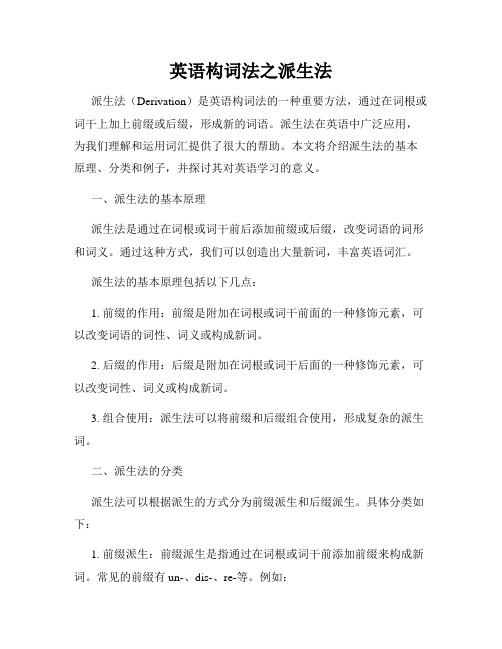
英语构词法之派生法派生法(Derivation)是英语构词法的一种重要方法,通过在词根或词干上加上前缀或后缀,形成新的词语。
派生法在英语中广泛应用,为我们理解和运用词汇提供了很大的帮助。
本文将介绍派生法的基本原理、分类和例子,并探讨其对英语学习的意义。
一、派生法的基本原理派生法是通过在词根或词干前后添加前缀或后缀,改变词语的词形和词义。
通过这种方式,我们可以创造出大量新词,丰富英语词汇。
派生法的基本原理包括以下几点:1. 前缀的作用:前缀是附加在词根或词干前面的一种修饰元素,可以改变词语的词性、词义或构成新词。
2. 后缀的作用:后缀是附加在词根或词干后面的一种修饰元素,可以改变词性、词义或构成新词。
3. 组合使用:派生法可以将前缀和后缀组合使用,形成复杂的派生词。
二、派生法的分类派生法可以根据派生的方式分为前缀派生和后缀派生。
具体分类如下:1. 前缀派生:前缀派生是指通过在词根或词干前添加前缀来构成新词。
常见的前缀有un-、dis-、re-等。
例如:- unlock(解锁)中的un-表示“解除”;- dislike(不喜欢)中的dis-表示“不”;- rewrite(重写)中的re-表示“再次”。
2. 后缀派生:后缀派生是指通过在词根或词干后添加后缀来构成新词。
常见的后缀有-er、-est、-ful等。
例如:- teacher(教师)中的-er表示“从事某种行为的人”;- tallest(最高的)中的-est表示“最”;- helpful(有帮助的)中的-ful表示“充满”。
三、派生法的例子以下是几个通过派生法构成的单词例子:1. 前缀派生的例子- Unhappy(不快乐):un-表示“不”,happy表示“快乐”,通过加入前缀un-,形成新的含义。
- Disappear(消失):dis-表示“否定”,appear表示“出现”,通过加入前缀dis-,形成相反的意义。
- Rebuild(重建):re-表示“再次”,build表示“建立”,通过加入前缀re-,表示再次进行建立。
高考构词法之派生法思维导图
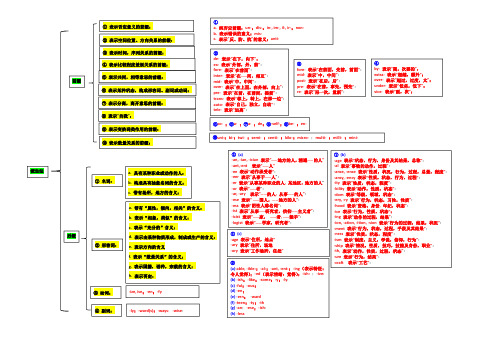
派生法前缀后缀①表示否定意义的前缀:②表示空间位置、方向关系的前缀:③表示时间,序列关系的前缀:④表示比较程度差别关系的前缀:⑤表示共同,相等意思的前缀:⑥表示某种状态,构成形容词、副词或动词:⑧表示“自我”:⑨表示变换词类作用的前缀:⑩表示数量关系的前缀:①名词:②形容词:③动词:④副词:a.具有某种职业或动作的人:b.构成具有抽象名词的含义:c.带有场所,地方的含义:a.带有“属性,倾向,相关”的含义:b.表示“相象,类似”的含义:c.表示“充分的”含义:d.表示由某种物质形成,制成或生产的含义:e.表示方向的含义f.表示“数量关系”的含义:g.表示国籍,语种,宗教的含义:h.表示否定:-ize,ise;-en;-fy-ly;-ward(s);-ways;-wise:①a.纯否定前缀:un-;dis-;in-,im-,il-,ir-;non-b.表示错误的意义:mis-c.表示“反、防、抗”的意义:anti-②de-表示“在下,向下”:ex-表示“外部,外,前”:fore-表示“在前面”:inter-表示“在……间,相互”:mid-表示“中,中间”:over-表示“在上面,在外部,向上”:pre-表示“在前,在前面,提前”:trans-表示“移上,转上,在那一边”:auto-表示“自己,独立,自动”:tele-表示“远离”:③fore-表示“在前面,先前,前面”:mid-表示“中,中间”:post-表示“在后,后”:pre-表示“在前,事先,预先”:re-表示“再一次,重新”:④by-表示“副,次要的”:extra-表示“超越,额外”:over-表示“超过,过度,太”:under-表示“低劣,低下”:vice-表示“副,次”:⑤co-;⑥a-;⑦a-;de;⑧-self-;⑨be-;en-⑩uni-;bi-;twi-;semi-;centi-;kilo-;micro-;multi-;milli-;mini-①(a)-an,-ian,-ician表示“……地方的人,精通……的人”-ant,-ent表示“……人”-ee表示“动作承受者”:-eer表示“从事于……人”:-er表示“从事某种职业的人,某地区,地方的人”-or表示“……者”:-ar,-ary表示“……的人,从事……的人”:-ese表示“……国人,……地方的人”:-ess表示“阴性人称名词”:-ist表示“从事……研究者,信仰……主义者”:-icist表示“……家,……者,……能手”:-logist表示“……学家,研究者”:①(b)-age表示“状态,行为,身份及其结果,总称”:-al表示“事物的动作,过程”:-ance,-ence表示“性质,状况,行为,过程,总量,程度”:-ancy,-ency表示“性质,状态,行为,过程”:-ity表示“性质,状态,程度”:-bility表示“动作,性质,状态”:-dom表示“等级,领域,状态”:-ery,-ry表示“行为,状态,习性,性质”:-hood表示“资格,身份,年纪,状态”:-ice表示“行为,性质,状态”:-ing表示“动作的过程,结果”:-ion,-ation,-ition,-sion表示“行为的过程,结果,状况”:-ment表示“行为,状态,过程,手段及其结果”:-ness表示“性质,状态,程度”:-ism表示“制度,主义,学说,信仰,行为”:-ship表示“情况,性质,技巧,技能及身份,职业”:-th,表示“动作,性质,过程,状态”:-ure表示“行为,结果”:-craft表示“工艺”:①(c)-age表示“住所,地点”-ary表示“住所,场地-ory表示“工作场所,住处”②(a)-able,-ible:;-al:;-ant,-ent:;-ing(表示特征:令人觉得);-ed(表示情绪:觉得);-ish:;-ive:(b)-ish;-like;-some;-y;-ly:(c)-ful;-ous;(d)-en;(e)-ern;-ward(f)-teen;-ty;-th(g)-an;-ese;-ish:(h)-less⑦表示分离,离开意思的前缀:。
构词法—派生法(前后缀)

构词法(一)——派生法(Derivation)词根(root)+词缀(affixes)构成新词,前缀法和后缀法。
通常前缀改变意义,后缀改变词性。
一.Prefix 前缀(一)前缀一般不改变词性1. 表达否定意义:dis- 否定,相反,除去(n.前)Eg: dislike v. 讨厌;discover v. 发现im- in- ir- il- ; un- 不,非(adj.或adv.前)Eg: impolite adj. 不礼貌的;impossible adj. 不可能的inconvenient adj. 不方便的incorrect adj. 不正确的;irregular adj. 不规律的;irresponsible adj. 不负责任的;illegal adj. 违法的;illiterate 不识字的unhappy adj. 不开心的;unforgettable adj. 无法忘记的non- 无,非,不(n.或adj.前)Eg: nonconductor n. 绝缘体;nonsense n. 胡说,废话mis- 错,误,恶(v.前)Eg: mistake n.&v. 错误,误解;misunderstand v. 误解for- 弃,禁Eg: forget v. 忘记forbid v. 禁止2. fore- 先,前Eg:forecast v. 预报;foretell v. 语言3. pre- 预先,之前的Eg: predict v. 预测prepare v. 准备4. post- 在……之后Eg: postwar adj.战后的;postgraduate n. 研究生5. mid- 中Eg:mid-term n. 期中的; middle n. 中间6. re- 重新,再一次,复(v.前)Eg: repeat v. 重复;return v. 返回,还;recycle v. 循环7. tele- 远,电(简写中常省略)Eg: telephone n. 电话;telescope v. 望远镜8. ex- 离开,前Eg: exit n. 出口ex-president n. 前总统9. self- 自动,自我Eg: self-assessment n.自我评价self-confident adj. 自信的10. over- 过于,翻Eg: overuse n. 过度使用overturn v. 打翻11. under- 不够Eg: underestimate v. 低估;12. trans- 跨越,移Eg: transportation n. 交通运输;transplant v. 移植13. micro- 微型,微缩Eg: microscope n. 显微镜; microwave n. 微波,微波炉14. mini- 特小的Eg: miniskirt n. 迷你裙minibus 迷你公交车15. semi- 半Eg: semi-final n. 半决赛;semicircle n. 半圆16. mono- 单Eg: monologue n. 独白monopoly n. 垄断17. bi- 双Eg: bicycle n. 自行车bimonthly adj. 双月的18. tri- 三Eg: triangle n. 三角形triplet n. 三胞胎19. multi- 多Eg: multimedia n. 多媒体multinational adj. 多国的20. auto- 自动Eg: automatic adj. 自动的automobile n. 汽车21. sub- 下面的Eg: subway n. 地铁subtitle n. 字幕,副标题22. super- 超级,上层Eg: superman n. 超人;supermarket n. 超市23. inter- 之间的,相互Eg: international adj. 国际的Internet n. 超市(二)改变词性的前缀1. a- 向里,离开,加强(v.或n.前构成adj.或adv.,adj.前构成prep.或adv.)Eg: awake adj. 醒着的; along prep.沿着,顺着;aside prep.&adv. 在……旁边;在旁边2.en- 使成为(n.或adj.前构成v.)Eg: enjoy v. 享受encourage v. 鼓励enable v. 是能够二.Suffix 后缀:(改变词性)1. 名词后缀:1)-ship 状态,身份(n.或adj.后,构成抽象n.)Eg: friendship 友谊;hardship 艰难,困苦2)-ness 状态,性质(adj.后,构成抽象n.)Eg: business 生意;sadness 悲伤;happiness 幸福3)-man 人,男人(n.后)Eg:policeman 警察superman 超人4)-ion 动作,状态(v.后)Eg: action 动作invention 发明decision 决定5)-er, -or 人,动作者,职业(v.后)Eg: writer 作家;waiter 男服务员;actor男演员;doctor 医生6)-ist 职业;主义者(n.后)Eg: pianist 钢琴家;scientist 科学家;revolutionist 革命主义者7)-ese,-(ia)n 人,语言(国名后构成adj.或n.)Eg: Chinese 中国人,汉语;Japanese 日本人,日语;Russian 俄国人,俄语;Italian 意大利人,意大利语8)-th 结果,过程(adj.和v.后,构成抽象n.)Eg:truth 真相;length 长度9)-hood 身份,境遇,状态(n.后)Eg: childhood 童年;neighborhood 邻居10)-ty 性质,状态,程度(adj.后,构成抽象n.)Eg:honesty 诚实;safety 安全11)-age 状态,集合(v.或adj.后)Eg: shortage 短缺;marriage 婚姻12)-ment ……的结果,手段(v.后)Eg: movement 运动;development 发展13)–ure ……的动作或过程(v. 后)Eg: failure 失败;pleasure 愉快;pressure 压力14)–dom ……状态,地位(v.或adj.后)级别、地位(n.后)Eg: kingdom 王国freedom 自由15)–ity (adj.后)Eg: reality 现实;activity 活动;possibility 可能性16)–y 有……倾向的(v后)Eg: difficulty 困难;discovery 发现17)–al ……的过程或状态(v. 后)Eg: arrival 到达;refusal 拒绝;survival 幸存18)–ance ;–ence ……的动作或状态(v.后)Eg: dependence 独立;difference 不同;assistance 协助2. 形容词后缀:1)-ly 品质,……的,每……的(n. 后)Eg: friendly 友好的;weekly 每周的2)-able ;-ible 能够,可……的(v.或n.后)Eg: acceptable 可接受的;unforgettable 无法忘记的3)-ed ……的,动作(v.或n.后)Eg: excited 感到兴奋的;surprised 感到惊讶的4)-ing 属于,性质,动作,状态(n.后构成n.或adj.,加在v.后构成n.)Eg: exciting 令人兴奋的;surprising 令人惊奇的;shopping 购物4)-en 由……制的(n.后)Eg: wooden 木头的;woolen 羊毛的5)-ern 方向(表方向的n.后)Eg: western 西方的;northern 北方的6)-ful 充满,……的(v.或n.后)Eg: colorful 多彩的;wonderful 棒极了7)-less 无……的,没有,不(n.或v. 后)Eg: hopeless 无望的;careless 粗心的8)-ive ……的,有……的(v.后)Eg: active 活跃的;productive 多产的9)-y (充满)……的(n.后)Eg: sporty 运动的;tasty 美味的10)-ish (多为贬义词)像……似的(n.后)Eg:childish 孩子气的,幼稚的;foolish 愚蠢的11)-like 类似;像Eg: childlike 孩子般的,天真的;womanlike 像女人的12)-ous 具有……性质的(n.后)Eg: dangerous 危险的;famous 著名的;courageous 有勇气的13)-some 引起……的;有……倾向的(n.和v.后)Eg: troublesome 麻烦的;handsome 英俊的;tiresome 令人生厌的14)-ary 与……有关的;……的(n. 后)Eg: revolutionary 革命的;customary 通常的,习惯的15)-ate 富于或显示某种性质(n.后)Eg: fortunate 幸运的;passionate 激情的16)-ant;-ent 处于……状态的;进行……动作的Eg: dependent 依赖的;different 不同的;consistent 持续的17)-ic ……的,关于……的Eg: classic 经典的;historic 历史性的;energetic 精力旺盛的18)-al ……的(n.后)……的状态或过程(v.后)Eg: arrival 到达;refusal 拒绝;survival 幸存3. 动词词缀1)-ize; -ise 成为……;使像……;使……化;以……的方式对待或处理;置于(n.或adj.后)Eg: realize 实现;organize 组织;criticize 批评2)-en 使,变得(adj.后)Eg: widen 拓宽;deepen 加深;sadden 使忧伤3)-ify 使得;变得(n.或adj.后)Eg: identify 识别;classify vt.分类,归类4. 副词词缀-ly 品质,……地(adj. 后)Eg: beautifully 优美地;slowly 慢慢地5. 数词词缀:1)-teen 十几(13-19)Eg: fifteen 十五;nineteen 十九2)-ty 几十(整数)Eg: twenty 二十;thirty 三十3)-th 第几(除尾数为1,2,3的)Eg: fifth 第五;ninth 第九6. 代词词缀-self(-selves)反身代词Eg: myself 我自己;ourselves 我们自己。
50-构词法之派生法
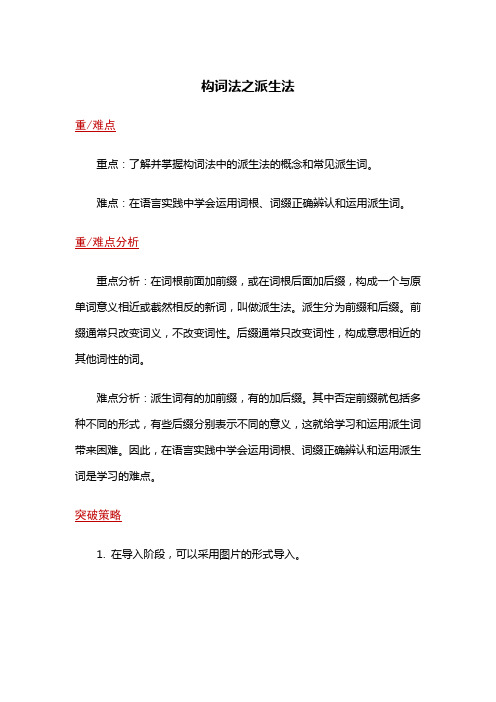
构词法之派生法重/难点重点:了解并掌握构词法中的派生法的概念和常见派生词。
难点:在语言实践中学会运用词根、词缀正确辨认和运用派生词。
重/难点分析重点分析:在词根前面加前缀,或在词根后面加后缀,构成一个与原单词意义相近或截然相反的新词,叫做派生法。
派生分为前缀和后缀。
前缀通常只改变词义,不改变词性。
后缀通常只改变词性,构成意思相近的其他词性的词。
难点分析:派生词有的加前缀,有的加后缀。
其中否定前缀就包括多种不同的形式,有些后缀分别表示不同的意义,这就给学习和运用派生词带来困难。
因此,在语言实践中学会运用词根、词缀正确辨认和运用派生词是学习的难点。
突破策略1. 在导入阶段,可以采用图片的形式导入。
比如,教师可以选用孔子名言的图片,教师呈现图片后,对图片内容进行描述“As Confucius put it, learning without thought is useless; thought without learning is dangerous. ”然后,教师指出:句中useless 和dangerous都是派生词。
那么,什么是派生词呢?在词根前面加前缀,或在词根后面加后缀,构成一个与原单词意义相近或截然相反的新词,叫做派生法。
派生分为前缀和后缀。
前缀通常只改变词义,不改变词性。
后缀通常只改变词性,构成意思相近的其他词性的词。
下面通过例句一起来学习构词法中的派生法。
2. 在语言感悟阶段,教师可以先提供例句,指出例句中派生词的构成,然后,和学生一起总结归纳该类派生词的构成和常用词汇,以此扩大词汇量。
课堂教学活动要体现学生的主体性,给学生留出足够的时间去讨论、归纳、总结。
在总结过程中,教师可以让学生先进行小组讨论,然后进行提问或者抢答,让学生说出相关派生词,教师要及时点拨。
当然,教师要及时肯定和表扬做得好的个人和小组,这也能够给学生带来学习的成就感,以此提高学生的课堂参与度与学习兴趣。
下面来分享中学时期的一次写作经历。
- 1、下载文档前请自行甄别文档内容的完整性,平台不提供额外的编辑、内容补充、找答案等附加服务。
- 2、"仅部分预览"的文档,不可在线预览部分如存在完整性等问题,可反馈申请退款(可完整预览的文档不适用该条件!)。
- 3、如文档侵犯您的权益,请联系客服反馈,我们会尽快为您处理(人工客服工作时间:9:00-18:30)。
explain→explanation解释
consider→consideration考虑
imagine→imagination想象力starve→starvation挨饿invite→invitation邀请;请柬prepare-preparation准备inspire-inspiration灵感
evident-evidence证据excellent-excellence优秀
innocent-innocence天真,无辜intelligent-intelligence智力patient-patience耐心romantic-romance浪漫
violent-violence暴力
-ance
important-importance重要性distant-distance距离
ess
host→hostess女主人waitress女侍应生goddess女神
act→actress女演员lioness母狮子
-an
America-American美国人Europe-European欧洲人Canada-Canadian加拿大人India-Indian印度人
ian
music→musician音乐家magician魔术师politics→politician政治家technician技术员history→historian历史学家physician医师
-ee
employ→employee受雇者;雇员interview→interviewee被面试者
train→trainee受训练的人;学员
or
invent→inventor发明者act-actor导演sail-sailor水手transistor晶体管
visit→visitor游客semi-conductor半导体translate-translator译者direct→director导演
-ism
socialism社会主义racism种族主义heroism英雄主义optimism乐观主义pessimism悲观主义
communism共产主义criticism批评
-ry
brave-bravery勇敢slave-slavery奴隶制度
2动词变名词的后缀
后缀
例词
-age
marry-marriage婚姻short-shortage短缺store-storage储存pack-package包裹carry-carriage车厢pass-passage通道
ness
weak→weakness虚弱;弱点kind→kindness仁慈;好意careless→carelessness粗心大意dark→darkness黑暗ill-illness疾病happy-happiness快乐great-greatness伟大cold-coldness寒冷,冷淡
aware-awareness意识bitter-bitterness苦blind-blindness失明calm-calmness冷静clever-cleverness聪明crazy-craziness疯狂
al
approve→approval赞成;批准arrive→arrival到来;到达survive→survival幸存propose→proposal提议;建议refuse-refusal拒绝deny-denial否认
ance
appear→appearance出现;外貌guide→guidance指引;指导perform→performance表演;履行accept-acceptance接受allow-allowance津贴,零用钱assist-assistance帮助,协助rely-reliance依赖resist-resistance抵制enter-entrance进入
-ese
Chinese中国人Japanese日本人Portuguese葡萄牙人
-eer
engineer工程师volunteer志愿者mountaineer登山家
-ar
lie→liar说谎者beg-beggar乞丐
(2)构成表示行为、性质、状态等抽象名词的常用后缀
1形容词变名词的后缀
后缀
例词
cy
efficient→efficiency效率;功效fluent→fluency流利;流畅accurate→accuracy准确性private→privacy隐私;私密urgent→urgency紧急,紧急的事emergent→emergency紧急情况
safe→safety安全real-reality现实;真实
active-activity活动possible-possibility可能性
disable→disability无能;残疾recover-recovery恢复discover-discovery发现
responsible→responsibility责任
eager-eagerness渴望fair-fairness公平foolish-foolishness愚蠢fit-fitness健康,适当lazy-laziness懒惰lonely-loneliness孤独quiet-quietness宁静sad-sadness悲伤serious-seriousness严重性sweet-sweetness甜美steady-steadiness稳定thick-thickness厚度tired-tiredness累cold-coldness冷,冷淡nervous-nervousness惶恐不安homesick-homesickness思乡careless-carelessness粗心selfish-selfishness自私selfless-selflessness/unselfishness无私helpless-helplessness无助hopeless-hopelessness无望hard-hardness硬度bright-brightness亮度
insure-insurance保险ignore-ignorance忽视
endure-endurance/tolerate-tolerance忍受
annoy-annoyance烦恼
ence
exist→existence存在;生存prefer→preference偏爱refer→reference参考;查阅perform-performance表演;节目occur-occurrence发生differ-difference不同offend-offence冒犯
invent-inventiiction预报,语言operate-operation操作/手术exhibit-exhibition展览protect-protection保护direct-direction方向,指导inject-injection注射infect-infection感染reject- rejection驳斥object-objection反对connect- connection连接
frustrate-frustration沮丧
introduce-introduction介绍reduce减少
produce-production生产
compete-competition比赛,竞争repeat-repetition重复suppose-supposition认为/假设oppose-opposition反对define-definition定义
collect-collection收集correct-correction纠正
inspect-inspection视察select-selection挑选elect-election选举restrict-restriction限制
contradict-contradiction矛盾decorate-decoration装饰communicate-communication交流hesitate-hesitation犹豫locate-location位置indicate-indication指出participate-participation参加calculate-calculation计算appreciate-appreciation欣赏,感激associate-association联想,协会separate-separation分离hibernate-hibernation冬眠compensate-compensation赔偿investigate-investigation调查celebrate-celebration庆祝congratulate-congratulation祝贺translate-translation翻译accumulate-accumulation积累accelerate-acceleration加速donate-donation捐赠liberate-liberation解放motivate-motivation动力innovate-innovation革新concentrate-concentration集中demonstrate-demonstration示威游行contribute-contribution贡献distribute-distribution分发promote-promotion促进devote-devotion奉献,献身dedicate-dedication奉献,献身
2018高考构词法之派生法
1.构成名词的常用后缀
(1)构成表示人或物的名词的常用后缀
后缀
例词
er
clean→cleaner清洁工thinker思想者pain-killer止痛药
report→reporter记者eye-opener使人惊奇的事物villager村民
strange→stranger陌生人interpreter口译者
defend-defence防御
